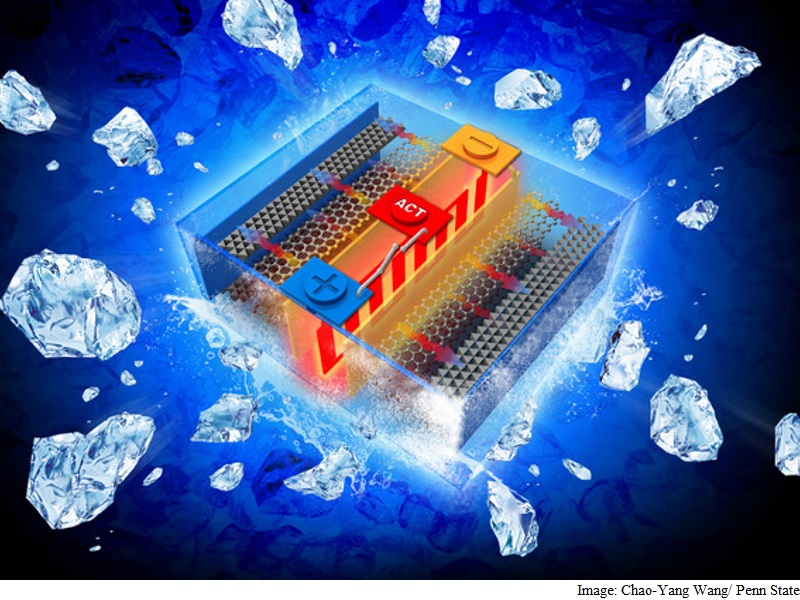- Home
- Science
- Science News
- Self Heating Battery to Beat Winter Woes for Electric Cars
Self-Heating Battery to Beat Winter Woes for Electric Cars

Conventional batteries at below freezing temperatures suffer severe power loss, which leads to slow charging in cold weather, the researchers said.
"It is a long standing problem that batteries do not perform well at subzero temperatures," said Chao-Yang Wang, professor at Pennsylvania State University in the US.
"This may not be an issue for phones and laptops, but is a huge barrier for electric vehicles, drones, outdoor robots and space applications," Wang noted.
The all-climate battery developed by the team of researchers from Pennsylvania State University and EC Power, a company providing solutions for various power needs, weigh only 1.5 percent more than conventional batteries.
Described in the journal Nature, the all-climate battery uses a nickel foil of 50-micrometre thickness with one end attached to the negative terminal and the other extending outside the cell to create another terminal.
A temperature sensor attached to a switch causes electrons to flow through the nickel foil to complete the circuit.
This rapidly heats up the nickel foil through resistance heating and warms the inside of the battery.
Once the battery is at zero degree Celsius, the switch turns off and the electric current flows in the normal manner.
While other materials could also serve as a resistance-heating element, nickel is low cost and works well, the researchers said.
Catch the latest from the Consumer Electronics Show on Gadgets 360, at our CES 2026 hub.
Related Stories
- Samsung Galaxy Unpacked 2025
- ChatGPT
- Redmi Note 14 Pro+
- iPhone 16
- Apple Vision Pro
- Oneplus 12
- OnePlus Nord CE 3 Lite 5G
- iPhone 13
- Xiaomi 14 Pro
- Oppo Find N3
- Tecno Spark Go (2023)
- Realme V30
- Best Phones Under 25000
- Samsung Galaxy S24 Series
- Cryptocurrency
- iQoo 12
- Samsung Galaxy S24 Ultra
- Giottus
- Samsung Galaxy Z Flip 5
- Apple 'Scary Fast'
- Housefull 5
- GoPro Hero 12 Black Review
- Invincible Season 2
- JioGlass
- HD Ready TV
- Laptop Under 50000
- Smartwatch Under 10000
- Latest Mobile Phones
- Compare Phones
- Honor Magic 8 RSR Porsche Design
- Honor Magic 8 Pro Air
- Infinix Note Edge
- Lava Blaze Duo 3
- Tecno Spark Go 3
- iQOO Z11 Turbo
- OPPO A6c
- Samsung Galaxy A07 5G
- Lenovo Yoga Slim 7x (2025)
- Lenovo Yoga Slim 7a
- Lenovo Idea Tab Plus
- Realme Pad 3
- Moto Watch
- Garmin Quatix 8 Pro
- Haier H5E Series
- Acerpure Nitro Z Series 100-inch QLED TV
- Asus ROG Ally
- Nintendo Switch Lite
- Haier 1.6 Ton 5 Star Inverter Split AC (HSU19G-MZAID5BN-INV)
- Haier 1.6 Ton 5 Star Inverter Split AC (HSU19G-MZAIM5BN-INV)







![[Sponsored] Haier C90 OLED TV | Dolby Vision IQ, 144Hz OLED and Google TV in Action](https://www.gadgets360.com/static/mobile/images/spacer.png)









